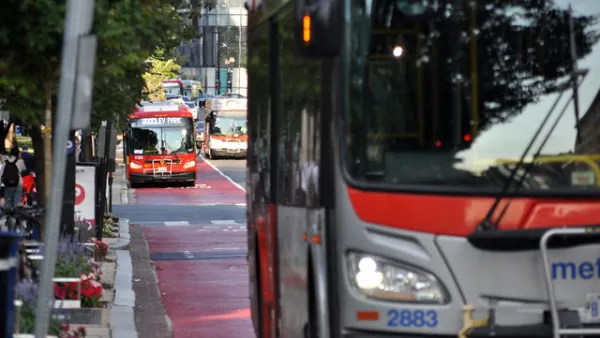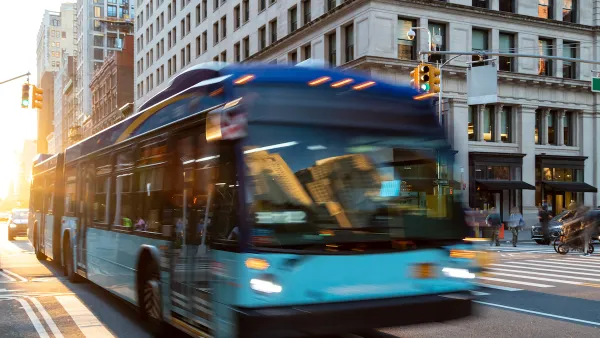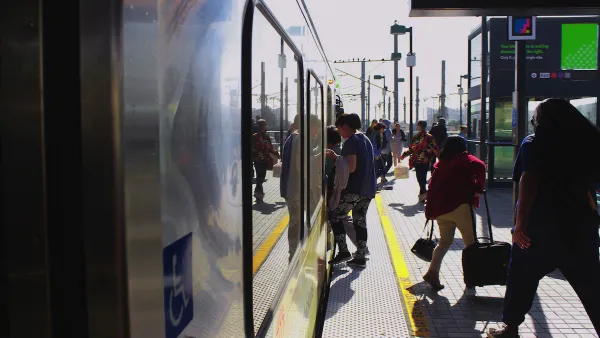Transit agencies around the country are boosting their efforts to serve historically marginalized communities and make transit work better for the households that rely on it the most.

A new report from the American Public Transportation Association (APTA) highlights the efforts transit agencies around the country are making to increase equity and provide effective transit service to the low-income households that often depend on it the most.
According to an article by Dan Zukowski in Smart Cities Dive, “The report summarizes equity-related actions from 75 organizations and takes an in-depth look at efforts by 11 transit agencies.”
Some agencies, like the Chicago Transit Authority (CTA) and the Central Puget Sound Regional Transit Authority, have created positions specifically dedicated to addressing equity. “The Massachusetts Bay Transit Authority requires an equity analysis for all proposed fare changes and major service changes,” while the Los Angeles County Metropolitan Transportation Authority (Metro) created an equity dashboard to increase transparency and appraise the public of its efforts.
In some cases, transit agencies are expanding their scope to support transit-oriented development with affordable housing and multimodal infrastructure near their stations. “Other agencies are getting directly involved with the communities they serve to address homelessness. The Metropolitan Atlanta Rapid Transit Authority is partnering with a homeless shelter to provide individual-level resources. The Lane Transit District in Eugene, Oregon, partnered with the city to find vacant land the transit agency owned that could be used as safe sleep areas for people experiencing homelessness,” Zukowski adds.
The APTA report offers three recommendations for transit agencies seeking to improve equity: develop an equity mission statement to guide goals and priorities; ensure the necessary internal resources to consider equity during all processes; and build community through initiatives that provide tangible benefits to the agency’s constituent communities.
FULL STORY: Transit agencies document equity efforts in APTA report

National Parks Layoffs Will Cause Communities to Lose Billions
Thousands of essential park workers were laid off this week, just before the busy spring break season.

Retro-silient?: America’s First “Eco-burb,” The Woodlands Turns 50
A master-planned community north of Houston offers lessons on green infrastructure and resilient design, but falls short of its founder’s lofty affordability and walkability goals.

Delivering for America Plan Will Downgrade Mail Service in at Least 49.5 Percent of Zip Codes
Republican and Democrat lawmakers criticize the plan for its disproportionate negative impact on rural communities.

Test News Post 1
This is a summary

Test News Headline 46
Test for the image on the front page.

Balancing Bombs and Butterflies: How the National Guard Protects a Rare Species
The National Guard at Fort Indiantown Gap uses GIS technology and land management strategies to balance military training with conservation efforts, ensuring the survival of the rare eastern regal fritillary butterfly.
Urban Design for Planners 1: Software Tools
This six-course series explores essential urban design concepts using open source software and equips planners with the tools they need to participate fully in the urban design process.
Planning for Universal Design
Learn the tools for implementing Universal Design in planning regulations.
EMC Planning Group, Inc.
Planetizen
Planetizen
Mpact (formerly Rail~Volution)
Great Falls Development Authority, Inc.
HUDs Office of Policy Development and Research
NYU Wagner Graduate School of Public Service





























